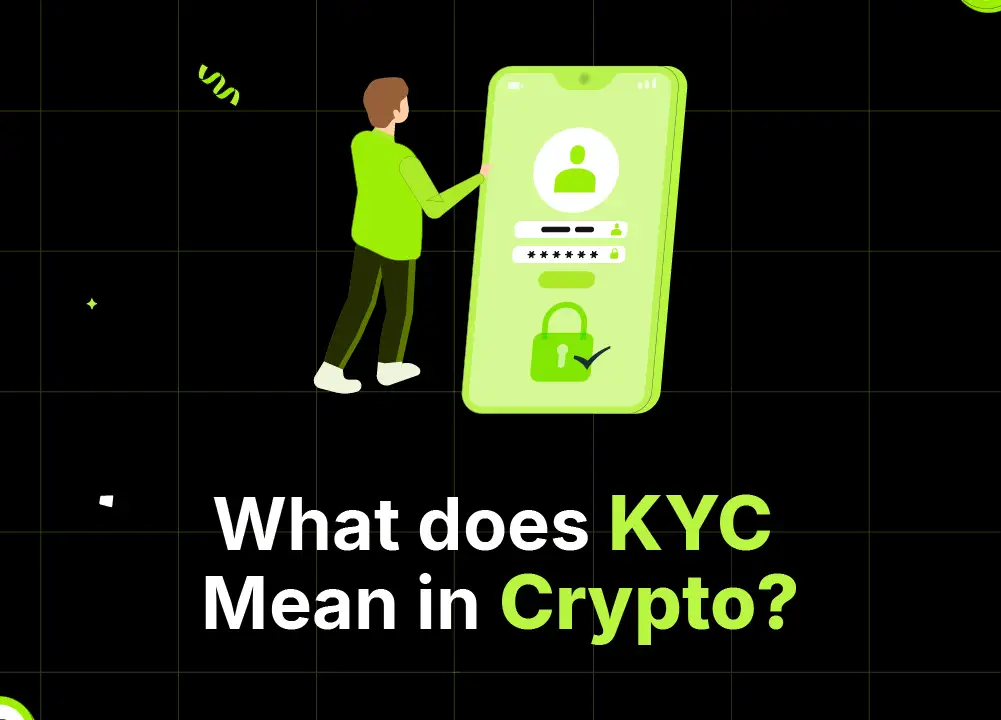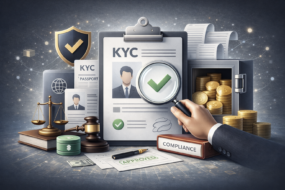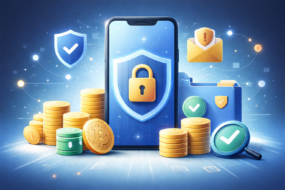
There are many cryptocurrency-related terms and phrases that might seem confusing at first. One such important term you’ll come across is “KYC,” which stands for “Know Your Customer.” This is a process used by businesses, especially those dealing with money, to make sure they know who their customers are.
When it comes to the crypto world, understanding KYC is important if you want to trade or invest safely and effectively

What is KYC All About?
KYC is basically a way for companies to protect themselves against illegal activities like money laundering, terrorist funding, and fraud. This process involves checking and confirming the customer’s identity. So, when you open a new bank account, start investing, or begin trading cryptocurrencies, you’ll probably have to go through a KYC check.
What Do You Need for KYC?
When you go through the KYC process, you’ll need to provide a few important pieces of information to verify your identity. Here’s a breakdown of what you might be asked for:
Proof of Identity
It is a way to confirm your identity, essentially showing that you are who you say you are. Common documents used for this include your passport, driver’s license, or a national ID card. These documents must be officially issued by the government and typically include your photo, name, and other personal details that can be checked against the information you provide.
Proof of Address
Proof of Address is a document that verifies where you live. You can use a recent utility bill (such as bills for water, gas, or electricity), a bank statement, or your lease agreement if you’re renting a place. These documents need to show your name and address and be recent enough to prove that you currently live at the listed location. This helps organizations confirm your residency for various purposes, including legal and billing reasons.
Additional Information
Any extra details you might need to provide during the verification process, based on the specific requirements of the company or the laws of your country is referred to as additional information.
This could include information about your employment, such as where you work and what your job involves. You might also need to explain how you earn your money, which could involve detailing your sources of income or providing financial statements. These details help the company understand your financial background and ensure that all transactions comply with legal standards.
The reason for collecting this information is for the company to really know who their customers are. This helps them manage any risks and keep an eye out for any strange or unusual transactions.

Why is KYC Important in Crypto?
Even though cryptocurrencies are famous for their privacy and for cutting out middlemen, this anonymity can also be misused for illegal purposes. As a result, many governments and regulatory bodies now require crypto exchanges and wallets to carry out KYC checks. This helps make the whole digital finance world more transparent and secure.
Pros and Cons of KYC in Crypto
Pros:
- Prevents Crime: It helps stop and track illegal activities.
- Regulatory Compliance: Ensures that crypto platforms follow the laws.
- Enhances Security: Verifying user identities helps make platforms safer for everyone.
Cons:
- Privacy Concerns: Some people feel that KYC takes away the privacy that crypto offers.
- Complexity: The process can be difficult and may turn away newcomers.
- Global Inconsistency: Different countries have different rules, which can make it hard for companies that operate worldwide.
How Does KYC Affect You?
If you’re getting into cryptocurrencies, here’s how KYC might impact you:
Onboarding Time
It refers to the amount of time it takes a user to start using a cryptocurrency service. The KYC process can affect this timing because it involves verifying your identity and other details. Depending on how thorough the verification needs to be and how quickly the service can process your information, this can take anywhere from a few minutes to several days. Essentially, it’s the time from when you sign up until you are fully able to use the service.
Transaction Limits
The maximum amount of money you can send or receive through a service within a certain period, like a day or a month is your transaction limit. If you haven’t completed the KYC process, the service might set lower limits on how much you can transact.
This is a precautionary measure to prevent illegal activities like money laundering. Once you complete KYC, proving your identity and other details, these limits are usually increased or removed altogether, allowing you to make higher or unlimited transactions. This helps ensure that the service is used safely and responsibly.
Account Recovery
It is the process of regaining access to your account if you lose it, for instance, by forgetting your password or if someone else gains unauthorized access. Having completed the KYC process can simplify this procedure. Because you’ve already verified your identity with the service by providing documents like a passport or driver’s license, they have a secure way to confirm you are the rightful owner of the account. This makes it easier and quicker to help you regain access, as they can match your current identification efforts with the information they already have on file.

Tips for Handling KYC in Crypto
Handling KYC doesn’t have to be tough. Here are some tips to make it easier:
Keep Documents Ready: Have all your necessary documents ready before you start the KYC process.
Know the Platform’s Rules: Each platform has its own requirements. Knowing them beforehand can help speed things up.
Ensure Privacy: Choose platforms that protect your data and have strong security measures.
The Future of KYC in Crypto
As the cryptocurrency market expands, the process for KYC is improving and becoming more efficient. KYC is essential for verifying the identity of people using crypto services to prevent illegal activities like money laundering. Currently, KYC can sometimes be a lengthy and intrusive process. However, as technology progresses, particularly with advancements in blockchain, KYC procedures are expected to become faster and less cumbersome.
Blockchain technology, which is the mainstay of cryptocurrencies, offers a unique opportunity to enhance KYC methods. It allows for the creation of secure, immutable records of users’ identities. This means once your identity is verified and stored on a blockchain, it can be easily and quickly accessed by any service or platform without the need to repeatedly submit the same documentation.
These improvements could lead to a KYC process that is not only quicker but also respects user privacy more than current methods. Users would not need to repeatedly provide sensitive information to different platforms, reducing the risk of data breaches or identity theft. Moreover, blockchain-based KYC solutions would ensure that all necessary regulatory requirements are met, keeping the process compliant with laws but making it significantly more user-friendly and efficient.
In summary, the future of KYC in the crypto world looks promising with the integration of blockchain technology, which aims to streamline the verification process while enhancing security and user privacy.
Final Thoughts
KYC is more than just a routine check. It’s a vital part of adding security and legitimacy to the crypto world. While it might seem like a hurdle to the privacy that crypto offers, it plays a crucial role in keeping the crypto space safe and in line with global standards.
Whether you’re experienced or new to crypto, understanding and navigating KYC is a key step in your crypto journey.
FAQs:
1. What does KYC mean in crypto?
KYC stands for “Know Your Customer.” It’s a process used by businesses dealing with financial transactions, including cryptocurrencies, to verify the identity of their clients. This helps prevent illegal activities such as money laundering and fraud.
2. Why is KYC important in the crypto world?
KYC helps ensure transparency and security in the digital finance world. Despite the anonymity typically associated with cryptocurrencies, KYC is crucial to prevent misuse for illegal purposes, making the entire system safer and more reliable.
3. What documents are typically required for KYC in crypto platforms?
You’ll need to provide a Proof of Identity (such as a passport, driver’s license, or national ID card), Proof of Address (like a utility bill or bank statement), and possibly additional information regarding your employment or source of funds depending on the platform’s rules and local regulations.
How does KYC affect my experience with crypto services?
KYC can affect the onboarding time, as verification can take from a few minutes to several days. It also impacts transaction limits, with unverified accounts usually facing lower limits. Additionally, KYC can aid in account recovery, making it easier to regain access if you lose it.
What are the pros and cons of KYC in crypto?
Pros: Helps prevent crime, ensures regulatory compliance, and enhances security.
Cons: Can infringe on privacy, adds complexity to the process, and faces global inconsistencies in regulations.
6. How can I make the KYC process easier when using crypto services?
Have all necessary documents ready, understand the specific requirements of the platform you’re using, and choose platforms known for protecting user data and providing strong security measures.
7. What is the future of KYC in crypto?
The KYC process is expected to become more efficient with advancements in technology, particularly through the use of blockchain. This could make KYC faster, less invasive, and more secure, streamlining the process while ensuring compliance with regulatory standards and enhancing user privacy.












